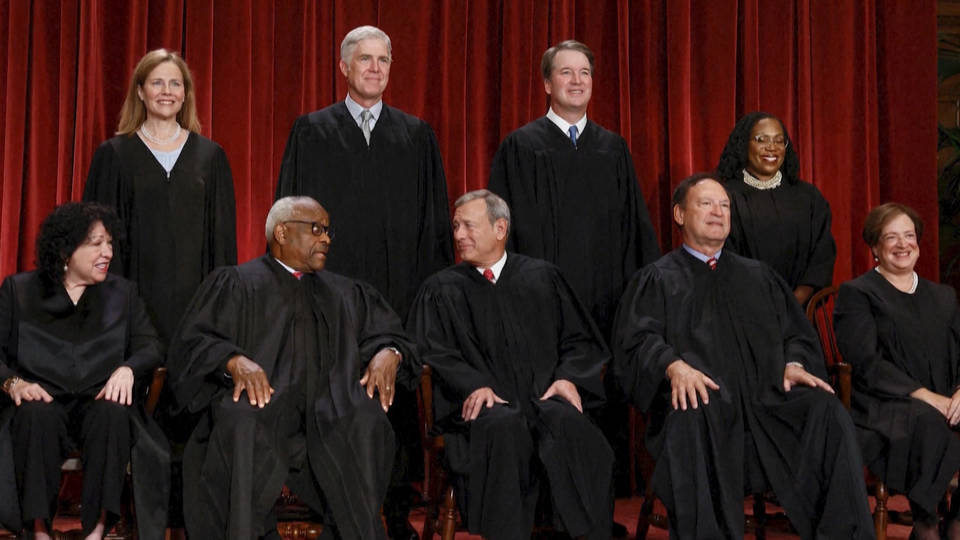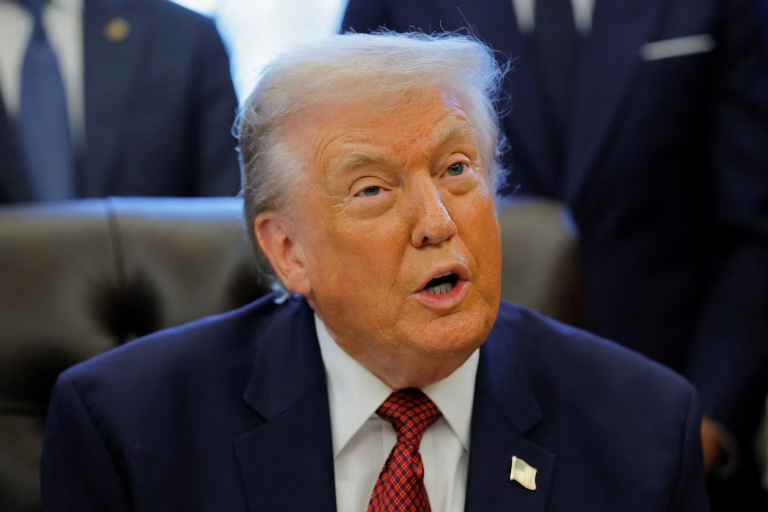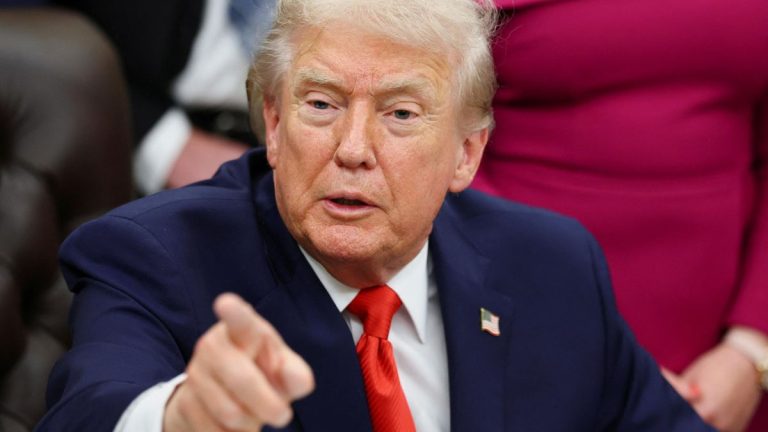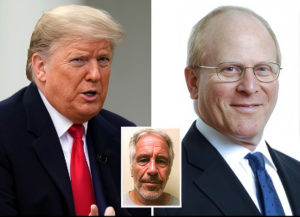Washington — In a sharply divided decision, the U.S. Supreme Court on Friday issued a 5-4 ruling granting emergency relief in a high-profile case involving the allocation of billions in U.S. foreign aid. The order temporarily halts lower court directives regarding the use of funds Congress approved last year, underscoring ongoing tensions between presidential authority and congressional control over federal spending.
The case centers on a dispute over more than $4 billion in funds earmarked for overseas development, peacekeeping operations, democracy promotion, and other international programs. President Trump sought to rescind a portion of these funds before the end of the fiscal year through a maneuver known as a “pocket rescission,” citing concerns that some programs were inconsistent with his administration’s policy priorities.
The Supreme Court’s order allows the administration to pause the release of the money, temporarily blocking a lower court injunction that required the government to spend the funds by September 30. While the ruling does not resolve the ultimate legality of the president’s actions, it signals that the potential harm to the executive branch in managing foreign affairs currently outweighs potential harm to the organizations and companies that depend on the funding.
A Divided Court
The 5-4 decision reflects the sharp ideological divide within the Supreme Court. Chief Justice John Roberts joined the court’s conservative bloc in granting the emergency relief. Justices Elena Kagan, Sonia Sotomayor, and Ketanji Brown Jackson issued dissenting views, warning that the ruling weakens Congress’s authority over federal appropriations.
In her dissent, Justice Kagan emphasized the importance of the separation of powers, noting that the ruling allows the executive branch to withhold billions of dollars approved by Congress, preventing the funds from reaching their intended recipients. “The effect of today’s grant is to allow the Executive to cease obligating funds that Congress clearly approved, and that will now never reach their intended recipients,” she wrote. “Because that result conflicts with the separation of powers, I respectfully dissent.”
The court’s majority, however, focused on the preliminary nature of the relief, emphasizing that the order should not be interpreted as a final judgment on the case. “The relief granted by the Court today reflects our preliminary view, consistent with the standards for interim relief,” the unsigned order stated.
The Legal Battle Over Foreign Aid
The dispute began earlier this year when nonprofit organizations and development contractors challenged the administration’s temporary suspension of foreign aid programs. In February, the administration imposed a 90-day pause on overseas development assistance to review whether programs aligned with presidential foreign policy priorities. This prompted several organizations and companies that rely on federal funding to file lawsuits claiming that the suspension violated federal appropriations law.
U.S. District Judge Amir Ali ruled in early September that the administration’s refusal to spend congressionally approved funds was likely illegal under federal law, noting that the executive branch could only withhold funding if Congress explicitly rescinded it through legislation. Judge Ali’s injunction required the government to release the funds, but the Trump administration immediately appealed, arguing that forcing the executive branch to disburse money would interfere with the president’s constitutional authority to conduct foreign affairs.
Earlier this year, the Supreme Court had already intervened. In March, it split 5-4 in leaving in place an order from Judge Ali requiring the administration to pay roughly $2 billion for foreign-aid work that had already been performed. The latest ruling represents the continuation of a long-running legal dispute over presidential authority and congressional oversight of federal spending.
Appeals Court Developments
The case also moved through the U.S. Court of Appeals for the District of Columbia Circuit. Last month, a three-judge panel ruled that the nonprofit organizations and development companies could not sue the administration solely on the grounds that the president violated the separation of powers by refusing to spend funds approved by Congress. The panel, which voted 2-1, overturned part of Judge Ali’s order that had prohibited the administration from withholding the foreign aid.
However, the D.C. Circuit later issued an amended opinion allowing the organizations to pursue relief on alternative legal grounds, leaving open the possibility of further litigation. Following this decision, President Trump formally notified Congress of his intention to rescind nearly $5 billion in foreign aid funding, arguing that the money supported programs he considered wasteful or inconsistent with his policy objectives.
The nonprofit plaintiffs then filed a new request for preliminary relief, asking Judge Ali to require the administration to spend the funds before the fiscal year ended. The judge reiterated that the executive branch had a legal duty to comply with Congress’s directives, further escalating the legal conflict.
Executive Branch Arguments
In filings with the Supreme Court, Solicitor General D. John Sauer argued that Judge Ali’s injunction threatened the constitutional separation of powers. He contended that forcing the executive branch to release funds against the president’s objectives would place the administration in conflict with itself, undermining its ability to conduct foreign affairs effectively.
“The President can hardly speak with one voice in foreign affairs or in dealings with Congress when the district court is forcing the Executive Branch to advocate against its own objectives,” Sauer wrote. He further described the injunction as “a grave and urgent threat to the separation of powers” that could prevent the executive branch from performing its constitutional functions.
Plaintiffs’ Arguments
Lawyers representing the nonprofit organizations and contractors countered that the government has been legally obligated to spend the funds since at least March 2024, when Congress enacted the appropriations legislation. They argued that the Impoundment Control Act, which is designed to prevent the executive branch from unilaterally withholding funds, does not grant the president the broad authority claimed by the administration.
“Congress would not have enacted a statute that provides the President vast new powers to impound funds and simultaneously makes it nearly impossible to challenge such impoundments in court,” the plaintiffs wrote. They warned that allowing the administration to withhold billions of dollars could threaten the survival of organizations that rely on federal aid to operate.
For instance, Democracy International reported that 98% of its revenues in 2024 came from U.S. Agency for International Development awards. Lawyers for the group argued that withholding the funds would create an existential threat to its operations, potentially leading to bankruptcy and disrupting critical programs overseas.
Broader Implications
The Supreme Court’s order represents only a preliminary step in an ongoing legal dispute, leaving the ultimate question of presidential authority unresolved. Legal experts note that the case highlights tensions between the executive branch and Congress over control of federal spending, particularly in areas related to foreign policy. While presidents have traditionally asserted discretion in managing appropriated funds, Congress retains constitutional authority over federal budgets, creating frequent friction when the two branches disagree.
The case also demonstrates the vulnerability of organizations that depend on federal foreign aid. Delays or interruptions in funding can disrupt programs ranging from humanitarian relief to democracy promotion, leaving both organizations and the communities they serve in uncertain positions.
Observers suggest that the Supreme Court’s 5-4 ruling could set a precedent for future disputes over the executive branch’s ability to withhold or rescind congressionally approved funds. The decision may embolden future administrations to assert broader control over appropriated resources, potentially reshaping the balance of power between Congress and the president.
For now, the immediate effect is that the administration retains control over more than $4 billion in foreign aid, at least temporarily. Congress, the nonprofit plaintiffs, and other stakeholders are expected to continue challenging the administration’s actions in court, ensuring that this legal battle remains a focal point of U.S. government policy and constitutional debate.
As the fiscal year draws to a close and the litigation continues, the Supreme Court’s divided ruling underscores the complex interplay between law, policy, and presidential power in the United States. Whether the administration ultimately succeeds in permanently withholding the funds or whether Congress’s authority is reaffirmed will have far-reaching consequences for foreign aid, the separation of powers, and the organizations that rely on federal funding to carry out programs around the world.

Emily Johnson is a critically acclaimed essayist and novelist known for her thought-provoking works centered on feminism, women’s rights, and modern relationships. Born and raised in Portland, Oregon, Emily grew up with a deep love of books, often spending her afternoons at her local library. She went on to study literature and gender studies at UCLA, where she became deeply involved in activism and began publishing essays in campus journals. Her debut essay collection, Voices Unbound, struck a chord with readers nationwide for its fearless exploration of gender dynamics, identity, and the challenges faced by women in contemporary society. Emily later transitioned into fiction, writing novels that balance compelling storytelling with social commentary. Her protagonists are often strong, multidimensional women navigating love, ambition, and the struggles of everyday life, making her a favorite among readers who crave authentic, relatable narratives. Critics praise her ability to merge personal intimacy with universal themes. Off the page, Emily is an advocate for women in publishing, leading workshops that encourage young female writers to embrace their voices. She lives in Seattle with her partner and two rescue cats, where she continues to write, teach, and inspire a new generation of storytellers.









